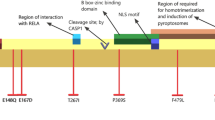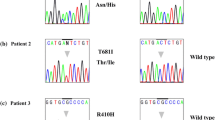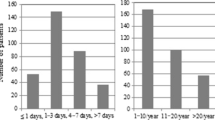Abstract
Turkey is one of the few countries in the world where Familial Mediterranean Fever (FMF), an autoinflammatory disease caused by mutations in MEFV, the gene encoding pyrin, is not rare. Many interesting studies regarding the genetics of Familial Mediterranean Fever in Turkey have been already published. Despite that different MEFV genetic profiles have been revealed for Turkish FMF patients, deriving from different regions of Turkey, a systematic population genetics analysis has not been carried out yet. The present study aims to investigate the population genetics of MEFV in Turkish FMF patients so as to additionally facilitate the clinical interpretation of individualized genetic data. All relevant studies have been recruited by searching PubMed with the terms “MEFV”, “FMF”, and “Turkey”. Seven of them, including 3,061 FMF patients, contained all necessary data concerning allelic and genotypic frequencies of the 4 commonest MEFV mutations in Turkey (M694V, V726A, M680I, E148Q). From all 6,122 MEFV alleles analyzed, the M694V mutation was recognized in 15.6–52.2% (mean 29.3%), the V726A in 1.5–9.7% (mean 4.8%), the M680I in 1.5–15.5% (mean 7.6%), and the E148Q in 3.2–13.9% (mean 5.5%). Unidentified mutations ranged from 0–42.9% (mean 16.8%). No mutations were found in 0–54.5% (mean 36.0%) of the patients. The allelic and genotypic frequencies of the most frequent mutation (M694V) showed aberration of the Hardy–Weinberg law for all 7 populations studied. By application of the Arlequin 2.0 population genetics software, the Fixation index (F ST) was found to be 0.09994, thus demonstrating that the observed variability is mainly within (90.006%) and not among (9.994%) populations (P < 0.00001). Moreover, the global test of differentiation demonstrated that every population differs from each other (P < 0.00325). Finally, the Ewens–Watterson test of selective neutrality yielded to statistical significance in only 3 populations. In conclusion, Turkish FMF patients are characterized by an increased genetic heterogeneity, explained by the intrapopulation differentiation. Thus, the regional origin should be regarded as a determining factor in the diagnosis of FMF in Turkish patients.
Similar content being viewed by others
References
Touitou I (2001) The spectrum of familial Mediterranean fever (FMF) mutations. Eur J Hum Genet 9(7):473–483
Tunca M, Akar S, Onen F, Ozdogan H, Kasapcopur O, Yalcinkaya F, Tutar E, Ozen S, Topaloglu R, Yilmaz E, Arici M, Bakkaloglu A, Besbas N, Akpolat T, Dinc A, Erken E, Turkish FMF Study Group (2005) Familial Mediterranean fever (FMF) in Turkey: results of a nationwide multicenter study. Medicine (Baltimore) 84(1):1–11
Akin H, Onay H, Turker E, Cogulu O, Ozkinay F (2009) MEFV mutations in patients with familial Mediterranean fever from the Aegean region of Turkey. Mol Biol Rep (under publication). doi:10.1007/s11033-009-9543-1
Ozturk A, Ozcakar B, Ekim M, Akar N (2008) Is MEFV gene Arg202GLN (605 G>A) a disease-causing mutation? Turk J Med Sci 38(3):205–208
Solak M, Yildiz H, Koken R, Erdogan M, Eser B, Sen T, Evirgen N, Erdem S, Arikan E (2008) Analysis of familial Mediterranean fever gene mutations in 202 patients with familial Mediterranean fever. Genet Test 12(3):341–344
Sahin FI, Yilmaz Z, Yurtcu E, Baskin E (2008) Comparison of the results of PCR–RFLP and reverse hybridization methods used in molecular diagnosis of FMF. Genet Test 12(1):171–174
Pasa S, Altintas A, Devecioglu B, Cil T, Danis R, Isi H, Bayan K, Tuzun Y, Ecer S, Batun S, Ayyildiz O (2008) Familial Mediterranean fever gene mutations in the southeastern region of Turkey and their phenotypical features. Amyloid 15(1):49–53
Yigit S, Bagci H, Ozkaya O, Ozdamar K, Cengiz K, Akpolat T (2008) MEFV mutations in patients with familial Mediterranean fever in the Black Sea region of Turkey: Samsun experience [corrected]. J Rheumatol 35(1):106–113
Yilmaz E, Ozen S, Balci B, Duzova A, Topaloglu R, Besbas N, Saatci U, Bakkaloglu A, Ozguc M (2001) Mutation frequency of familial Mediterranean fever and evidence for a high carrier rate in the Turkish population. Eur J Hum Genet 9(7):553–555
Schneider S, Roessli D, Excoffier L (2000) Arlequin ver. 2.000: a software for population genetics data analysis. Genetics and Biometry Laboratory, University of Geneva, Geneva
Giaglis S, Papadopoulos V, Kambas K, Doumas M, Tsironidou V, Rafail S, Kartalis G, Speletas M, Ritis K (2007) MEFV alterations and population genetics analysis in a large cohort of Greek patients with familial Mediterranean fever. Clin Genet 71(5):458–467
Papadopoulos VP, Giaglis S, Mitroulis I, Ritis K (2008) The population genetics of familial Mediterranean fever: a meta-analysis study. Ann Hum Genet 72(6):752–761
Giaglis S, Mimidis K, Papadopoulos V, Thomopoulos K, Sidiropoulos P, Rafail S, Nikolopoulou V, Fragouli E, Kartalis G, Tzioufas A, Boumpas D, Ritis K (2006) Increased frequency of mutations in the gene responsible for familial Mediterranean fever (MEFV) in a cohort of patients with ulcerative colitis: evidence for a potential disease-modifying effect? Dig Dis Sci 51(4):687–692
Booty MG, Chae JJ, Masters SL, Remmers EF, Barham B, Le JM, Barron KS, Holland SM, Kastner DL, Aksentijevich I (2009) Familial Mediterranean fever with a single MEFV mutation: where is the second hit? Arthritis Rheum 60(6):1851–1861
Marek-Yagel D, Berkun Y, Padeh S, Abu A, Reznik-Wolf H, Livneh A, Pras M, Pras E (2009) Clinical disease among patients heterozygous for familial Mediterranean fever. Arthritis Rheum 60(6):1862–1866
Ritis K, Giaglis S, Spathari N, Micheli A, Zonios D, Tzoanopoulos D, Deltas CC, Rafail S, Mean R, Papadopoulos V, Tzioufas AG, Moutsopoulos HM, Kartalis G (2004) Non-isotopic RNase cleavage assay for mutation detection in MEFV, the gene responsible for familial Mediterranean fever, in a cohort of Greek patients. Ann Rheum Dis 63(4):438–443
Author information
Authors and Affiliations
Corresponding author
Rights and permissions
About this article
Cite this article
Papadopoulos, V., Mitroulis, I. & Giaglis, S. MEFV heterogeneity in Turkish Familial Mediterranean Fever patients. Mol Biol Rep 37, 355–358 (2010). https://doi.org/10.1007/s11033-009-9779-9
Received:
Accepted:
Published:
Issue Date:
DOI: https://doi.org/10.1007/s11033-009-9779-9




